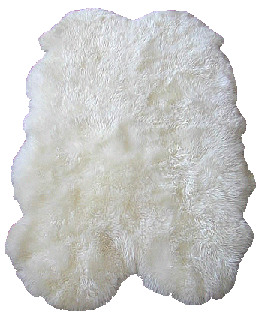
About Australia
Australian Foods, Gifts and Souvenirs
401 Isom Rd, Suite 500, San Antonio, Texas, 78216, USA
Phone 210-299-1077, Fax 210-541-6755
www.about-australia-shop.com
MERINO SHEEP SKINS

Ivory Merino Sheep skin
Buy Merino sheep skins and other Audstralian Goods (Click Here)
MERINO SHEEP SKIN
|
The Australian Merino is a breed of sheep that has
adapted to the Australian climate over the 200 years that it has lived in
Australia. Originating from the Merino (a Spanish breed), through all
kinds of crossbreeding and selection, the Australian Merino is known for
it's fine wool, which is exported all over the world.
|
THE BENEFITS OF SHEEP SKIN
|
Sheep skins keep you cool in summer and warm in the
winter, because of the breathing properties of the wool's hollow fibres.
They are comfortable because they are extremely soft, and they provide a
blanket of air that acts as an insulator. This resilient fur can absorb up
to a third of its weight in moisture, without the slightest hint of
feeling damp, so it's great for all kinds of environments; even when it's
wet it doesn't stop keeping you warm! The advantage of sheep skin over
woolen fabrics is that sheep skin wool is embedded into the leather, does
not shed, and was never removed, as opposed to wool pile that has been
woven and manufactured. Unlike nylon, wool is also static-free, and even
fire resistant! Many of these properties of sheep's wool are thanks to a
natural oil that is present in it called lanolin (see lanolin),
a natural moisturiser and waterproofing agent. Sheep skins are also
machine washable! (see care
instructions) |
THE USES OF SHEEP SKIN
|
Sheep skin has a whole range of uses. Home decoration
is one of the most popular uses of sheep skin, whether it be a big soft
rug placed in front of your fireplace, throws for throwing over your
lounge pieces or bedspread or bedside rugs. They're also great for baby
rugs and for lining baby strollers, as well as seat covers for your car,
as they allow a flow of air between you and the fibres of the fur - much
more comfortable than vinyl or leather which doesn't breathe nearly as
well. Because of it's insulating and moisture-absorbing properties, sheep
skin slippers
are another popular use. |
MEDICAL USE OF SHEEP SKIN
|
Medicine also creates a major demand for sheep skin
because it's great for comforting the sick and the elderly. Used in
hospital beds and often in wheelchairs, sheep skin absorbs and wicks
moisture, helping to regulate body heat, stops patients from getting
bedsores from prolonged bed rest, distributes weight, and provides a soft
comfort with minimal friction.
|
WHAT IS LANOLIN?
|
Lanolin is the precious oily secretion of a sheep's
skin, which becomes trapped in the sheep's wool; and being the natural
nourisher and protector against the extremes of the sheep's environment,
has many valuable properties to take note of. For one, It is a
waterproofing agent for sheep, helping to insulate the skin when it's wool
is wet. Lanolin is also an antibacterial moisturiser, which is highly
compatible with human skin because it is derived from an animal source as
opposed to mineral or vegetable source as most moisturisers are. Lanolin
can not only be found in sheep skins, but also in a wide range of lanolin
skin care products such as creams and soaps, which you can check out Here.
|
CARE INSTRUCTIONS
|
The sheep skins that we sell are completely machine
washable, but we highly recommend that you use Eucalan
Woolwash in doing so. A concentrate enriched with lanolin and with
added eucalyptus oil, Eucalan is designed for washing sheep skins and
replenishing their lanolin content. Machine Wash: Fill machine with tepid water (luke-warm). Add Eucalan concentrate - approximately 5mL, or one teaspoon, per gallon of water, using more for heavily soiled items. STOP MACHINE. Load with articles to be washed; soak for about half an hour. Squeeze gently by hand. BY-PASS RINSE CYCLE! Spin water out. Hand Wash: Add approximately 5mL, or one teaspoon, per gallon of tepid water (luke-warm), using more for heavily soiled items. Soak article for 15 minutes or longer. Squeeze gently to remove dirt and water. DO NOT RINSE! Important: Always test colour-fastness. Avoid heavy agitation. Lay knit articles flat to dry. |
Buy Merino sheep skins and other Australian Goods (Click Here)
Privacy Policy

About Australia
Australian Foods, Gifts and Souvenirs
401 Isom Rd, Suite 500, San Antonio, Texas, 78216, USA
Phone 210-299-1077, Fax 210-541-6755
www.about-australia-shop.com